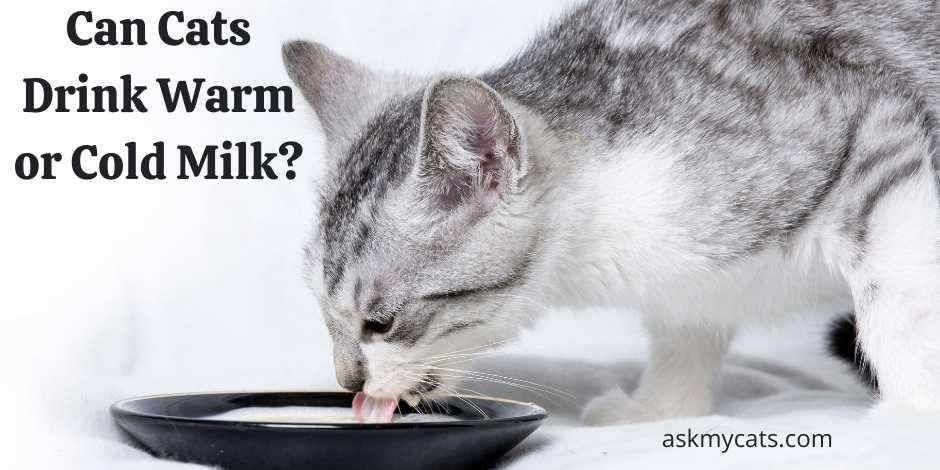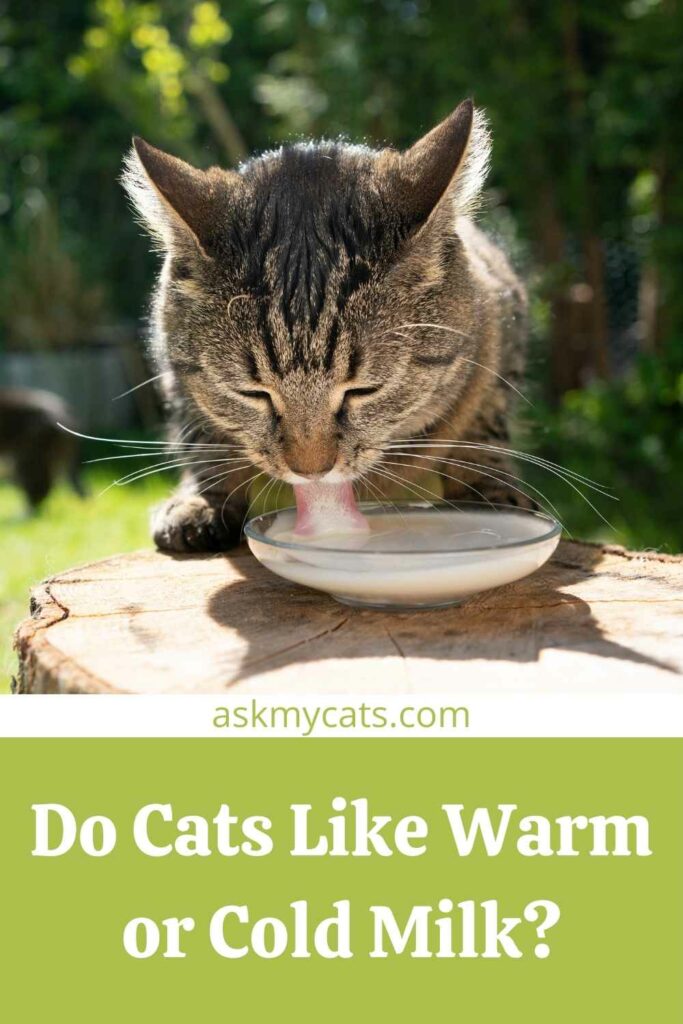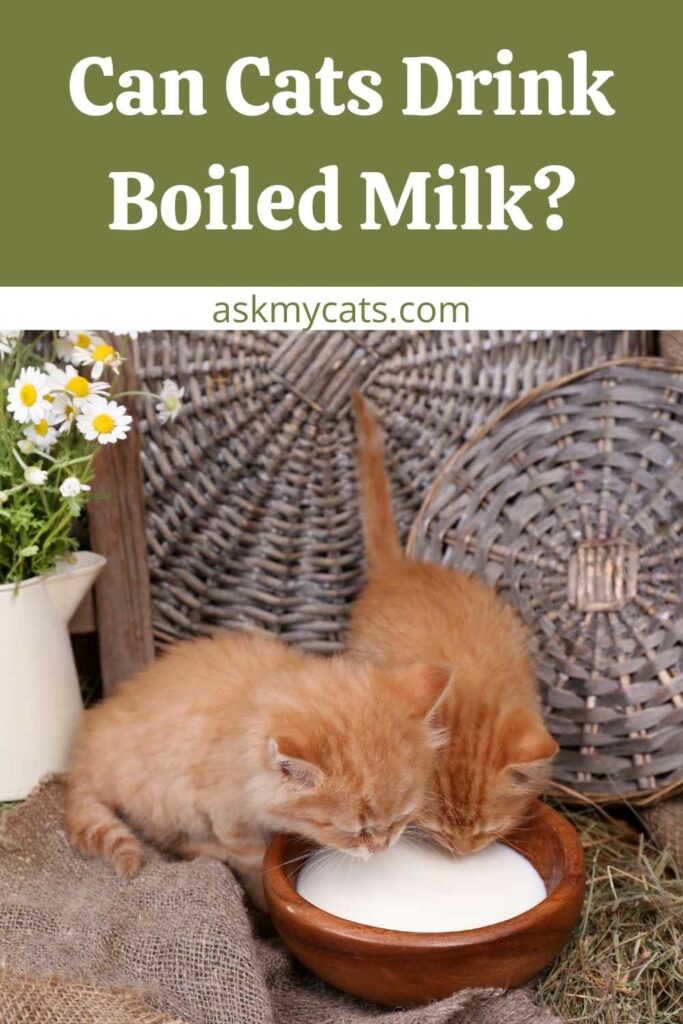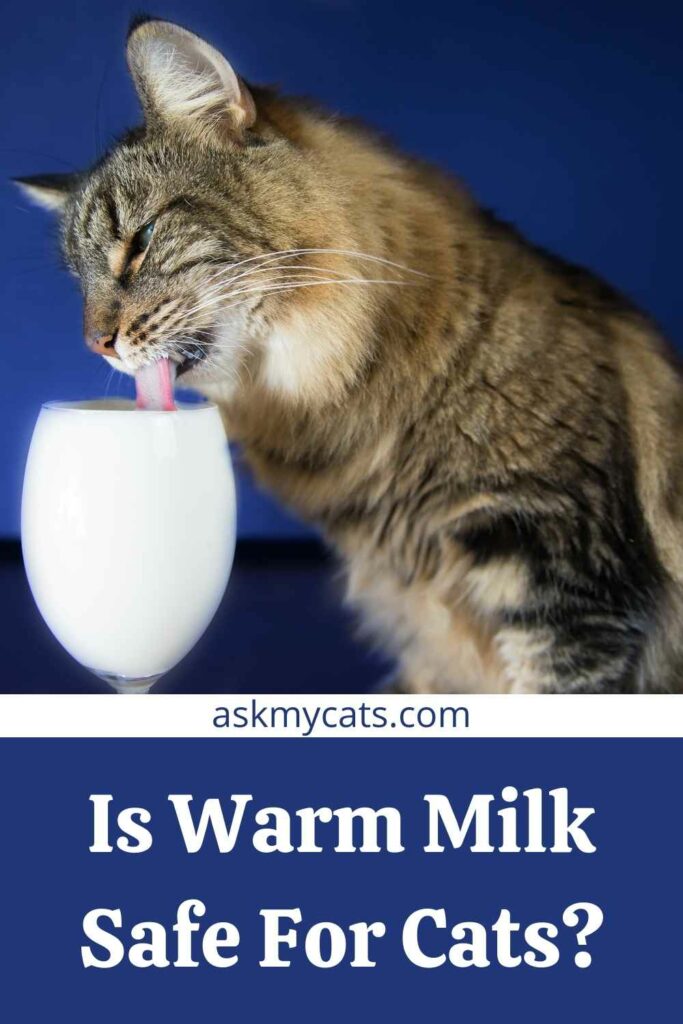In movies and animations, cats are seen drinking milk from saucers. It’s become a symbol of famished kittens and cats all across the world, but is it something your cat should drink? Is it possible that it will injure your kitty companion?
It’s difficult to determine what human meals are permissible for pets.
Many cats enjoy drinking cold milk. Cats will drink milk if it is presented to them since it is fresh and cool, and some may appreciate the flavor.
Kittens can consume milk because they possess lactase enzymes, which allow them to break down the lactose sugars in milk. Some cats can still drink milk, but these are the exceptions.


Give Your Cat the Perfect Day
Get the Free Ebook!
Do Cats Like Warm or Cold Milk?
Cats prefer to drink cold milk as it is refreshing for them.

No, if the milk isn’t coming from another cat. Even when diluted with water, milk is terrible for them and causes them to vomit or have diarrhea. In terms of cat milk, I’m presuming that when kittens drink from their mother, it’s at body temperature, which means it’s warm but not too hot.
If you’re giving kitten milk to replace its mother’s milk for whatever reason, it should be at the same temperature as a cat’s milk. Ask your veterinarian; he’ll be the most knowledgeable!
Milk is poisonous to cats. Lactose intolerance is a problem for them.
Kittens are not allowed to drink milk, thus if you have to give a kitten something other than its mother’s milk because it’s been abandoned or orphaned, it should be KMR (kitten milk replacement). They are unable to consume cows or any other type of milk.
Adult cats are also unable to consume milk. Any remaining lactose tolerance they may have had has vanished totally. Cat milk can be purchased for cats that need to be treated or whose food has to be mashed with milk (due to lack of teeth, for example), but it is not the same as regular milk.
The temperature of the milk isn’t an issue in this case. Milk from one species is incompatible with milk from another species.
Find a KMR (Kitten Milk Replacement) from your local Pet Store if you have little kittens who require milk but don’t have access to their mother.
They don’t require milk if they’re older than three months. They’ll eat dry food from a reputable brand or wet food (preferred).
Adult animals do not benefit from milk. It’s preferable to use seasoned cheese. If you’re talking about kittens, you should invest in some “cats’ milk.” Lactose cannot be digested by mature animals; it will not kill the cat, but it will dehydrate it and induce diarrhea, weakening it.
You might also like to read about can cats drink goat milk
Can Cats Drink Boiled Milk?
Cats are lactose intolerant, so they are allowed to drink only a few quantities of boiled milk.

You should never give cow’s milk to your cat. It is harmful to them and will result in diarrhea. All your cat need is to be given a reputable brand of dry cat food and to have fresh water accessible at all times.
There are two solutions to the question of whether it is safe to drink milk that has been “tasted” by a cat, even after it has been boiled. Most bacteria that the cat has transferred to the milk will be killed by boiling it.
Even after boiling, there are some hazards in drinking the milk. The other option is that on many small farms, barn cats congregate during milking. They either “steal” a lick or are fed little quantities dropped on the floor from the milk pail.
Pasteurizing milk is simple, but it takes more than simply boiling. Slowly bring the milk to a temperature of 145°F, stirring periodically. If you’re not using a double boiler, make sure to stir the milk regularly to avoid scorching it.
Keep the milk at 145 degrees Fahrenheit for exactly 30 minutes. To maintain a steady temperature, you may need to raise and reduce the heat.
Remove the milk pot from the heat and immerse it in icy water in a sink or big basin. Stir frequently until the temperature reaches 40 degrees Fahrenheit. Pasteurized milk should be kept in the refrigerator.
Does Cat Milk Have To Be Warm?
No, it is not essential for a cat’s milk to be warm.
The milk should be between 35 and 38 degrees Celsius (95-100 degrees Fahrenheit). They’ll only consume a modest amount since their stomachs are so small that they get full quickly. The duration between meals will increase as they develop since they will be able to swallow more milk each time.
In addition to the possibility of gastrointestinal issues, Pouring milk into your cat’s food may lead to her consuming too much milk and not enough solid food to satisfy her nutritional requirements.
Is Warm Milk Safe For Cats?
No, warm milk is not safe for cats because they are lactose intolerant.

During their initial weeks, kittens obtain all of their nutritional needs from their mother’s milk. As your kitten grows into an adult, normal cat food, as recommended by your veterinarian, offers the nourishment your feline companion requires to be happy and healthy.
As your cat matures, you may realize that she craves dairy. However, you should still consider if milk is harmful to cats. Your family’s cow’s milk should never be offered to kittens or cats since it might induce diarrhea.
You can buy a commercial milk substitute if the mother cat’s milk isn’t accessible. The milk in your breakfast dish should not be your next choice.
Because cats lack substantial levels of lactase in their systems, milk should not be given to them as a treat or as a substitute for water.
Lactase is an enzyme that breaks down lactose in milk when it is consumed, and if there isn’t enough lactase present, the lactose can cause disease. Yes, cats may be lactose intolerant, just like people. The most common symptoms are diarrhea, gas, and vomiting.
Animals, like humans, gain weight by eating more calories than they require. Because the average home cat does not receive enough activity, adding milk calories to a normal feeding schedule might lead your cat to gain weight.
You’ll have to cope with both a fat and a sick cat.
Also, check out can cats drink lactose-free milk
What Does Warm Milk Do To Cats?
Drinking warm milk provides extra warmth to your cat and he feels relaxed.
Is Warm Milk Good For Kittens?
Yes, kittens should only be fed warm milk.
Give them cat’s milk before bed to keep their stomachs full. This will also help you maintain your composure. You may also serve them warm food before going to bed.
Before feeding, check the temperature of the formula; it should be warm but not hot, approximately 100 degrees Fahrenheit.
When a cat is reclining on its back when eating, it is more likely to aspirate, which means the kitten breathes the formula into its respiratory system rather than swallowing it.
Can Cats Drink Cold Milk?
Yes, cats can drink only a little amount of cold milk.
Is Cold Milk Good For Cats?
No, cold milk is not good for cats. However, you can feed them in small amounts.
Frequently Asked Questions
What milk is safe for kittens?
The only milk that kittens should drink is their mother’s, or a kitten milk replacer, often known as KMR or kitten milk formula.
When do kittens stop drinking milk?
Weaning most kittens from their mother or a bottle takes four to six weeks (if orphaned). Weaning is a quick procedure; a normal kitten will be completely weaned between the ages of eight and 10 weeks.
What happens if you feed a cold kitten?
Always evaluate a kitten before feeding it to ensure it is safe to eat. It is not safe to feed a kitten that is overheated or too chilly until its temperature has been gradually adjusted. It is not safe to feed a kitten if it is unable to swallow.
Final Words
Lactose-free milk is the only milk that cats should consume. Cow’s milk can be given to cats that aren’t lactose intolerant, although yogurt, kefir, or goat’s milk are preferable options.
Even while most cats can stomach at least one type of milk, this does not imply they should.
If you have any questions, leave them in the comments section below.
Interesting Read: Can Pregnant Cats Drink Milk?
